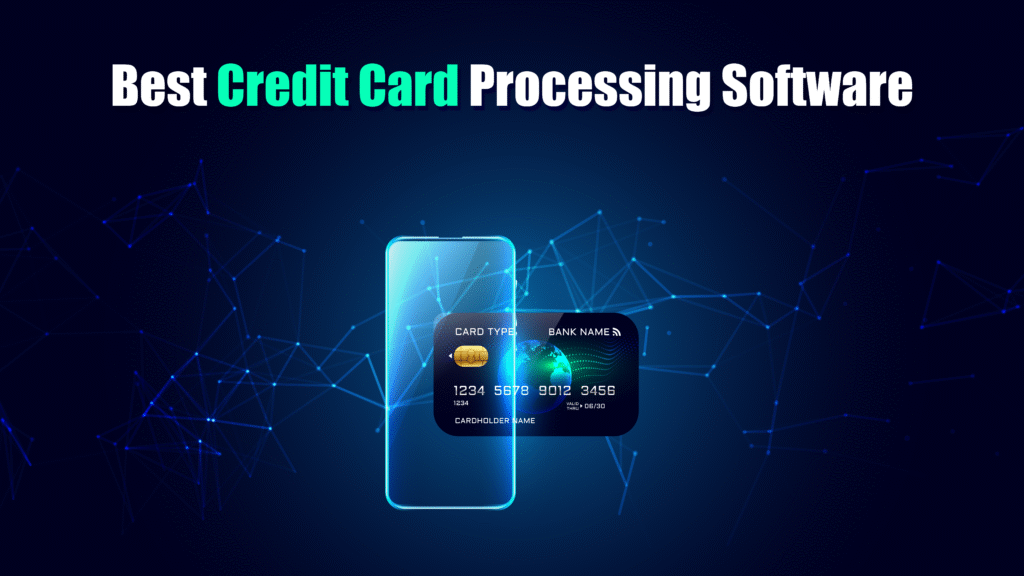Choosing the right credit card processing software is essential for seamless transactions, secure payments, and business growth. Whether you’re a small business owner, an eCommerce seller, or managing high-volume transactions, the right solution helps you streamline payment operations, reduce fees, and ensure PCI compliance.
Today’s leading credit card processing platforms offer powerful features such as point-of-sale integration, mobile payments, online checkout, fraud detection, real-time reporting, and support for recurring billing. Many also offer flat-rate or interchange-plus pricing models, helping businesses stay cost-efficient and transparent in their financial operations.
To help you choose the right platform, we’ve evaluated and ranked the 15 best credit card processing software solutions in 2026, based on features, ease of use, pricing, customer support, scalability, and real user feedback.
Here’s a quick look at our top picks:
- Stripe – Best for scalable global payment processing and accessible analytics
- Square – Best for small business point-of-sale and omnichannel selling
- Shopify Payments – Best for Shopify eCommerce stores
- Braintree (by PayPal) – Best for online and mobile payments
- Helcim – Best for fast-growing businesses with transparent pricing
- Stax – Best for high-volume businesses (subscription-based model)
- PaymentCloud – Best for high-risk businesses (e.g., CBD, firearms, etc.)
- Payment Depot – Best for transparent, membership-style pricing
- GoCardless – Best for recurring and direct debit payments
- Clio Payments – Best for law firms (integrated with Clio legal software)
- Versapay – Best for accounts receivable automation and B2B collaboration
- Clearly Payments – Best for lowest processing fees with great support
- NetSuite Payment Processing – Best for ERP-integrated payment management
- CardX (by Stax) – Best for businesses interested in compliant surcharging
- Sage Debit and Credit Card Processing – Best for ERP integration and accounting systems.
Before You Continue…
Before selecting the right credit card processing software in the USA for your business, it’s crucial to evaluate your business type, sales volume, risk level, and transaction channels. Align your specific needs with platform features such as PCI compliance, transparent pricing models, integration capabilities, and support for in-person, online, and mobile payments. Prioritize security, ease of use, and scalability to ensure the software can grow alongside your business and maintain compliance with U.S. regulations.
Questions to Ask When Choosing the Right Credit Card Processing Software
- Does the platform support your preferred payment methods (in-store, online, mobile) Ensure the provider supports all channels you plan to use—whether it’s point-of-sale systems, online carts, or mobile apps—to deliver a seamless payment experience.
- Is the pricing model transparent and cost-effective for your business size?
Look for clear pricing structures—flat-rate, interchange-plus, or subscription-based—and watch for hidden fees like setup charges, monthly minimums, or cancellation costs. - Does the software ensure PCI DSS compliance and fraud prevention?
Compliance with PCI standards is essential for securely handling customer payment data. Advanced fraud tools and encryption protect your business and customers. - Can it integrate with your current systems and software?
Check whether the platform integrates with accounting software, eCommerce platforms, CRMs, or inventory systems to streamline your operations. - Is the solution scalable and flexible for future growth?
Choose a provider that can scale with your business—from startups to high-volume enterprises—and offers features like recurring billing, multi-location support, and detailed reporting. - Does the provider offer reliable customer support?
Timely and expert support is crucial, especially if you experience payment issues. Look for 24/7 service, onboarding help, and a responsive support team.
Differences in Pricing and Pricing Models
Pricing plays a major role when selecting the right credit card processing software in the USA—especially for startups, freelancers, and small-to-medium-sized businesses. Providers use different pricing models, including flat-rate, interchange-plus, subscription-based, or blended pricing, making direct comparisons more complex. Some include monthly fees and hardware costs, while others focus on transaction fees only.
Pricing Comparison for Small Businesses and Startups
For small businesses or solo entrepreneurs, platforms like Square, Stripe, and Helcim offer transparent, low-commitment pricing models.
- Square and Stripe typically charge flat-rate fees around 2.6% + 10¢ per transaction, with no monthly fees, making them ideal for businesses just getting started.
- Helcim offers interchange-plus pricing with no monthly fee and volume-based discounts, giving small businesses room to grow affordably.
These providers are great for those looking for simplicity, easy setup, and built-in POS or online checkout tools.
Pricing Comparison for High-Volume and Growing Enterprises
For mid-sized to large businesses or those processing high transaction volumes, platforms like Stax, Payment Depot, and Braintree provide more cost-effective solutions at scale.
- Stax uses a subscription-based model starting around $99/month, with direct access to wholesale interchange rates—ideal for businesses processing over $10,000/month.
- Payment Depot also uses a membership pricing model, starting from $59/month, and includes unlimited transactions at cost, reducing fees for high-volume sellers.
- Braintree, while owned by PayPal, offers custom pricing and is better suited for tech-savvy businesses that require advanced mobile or marketplace solutions.
These platforms deliver lower per-transaction costs, robust APIs, and powerful integrations—perfect for growing brands and enterprise-level needs.
Want to explore the full breakdown of features, pricing, and value? Keep reading for detailed reviews of the top 15 credit card processing software platforms in the USA for 2026.
1. Stripe – Best for Scalable Global Payment Processing and Analytics

Stripe is a leading payment processing platform widely used by online businesses, SaaS companies, and digital marketplaces. It’s known for its robust APIs, international capabilities, and data-rich dashboard. Stripe supports a wide variety of payment methods and currencies, making it an ideal solution for businesses aiming to grow globally. With advanced developer tools and seamless integrations, Stripe helps businesses automate workflows, streamline payments, and reduce risk.
Features
- Customizable API for full integration
- Support for over 135 currencies and popular payment methods
- Advanced fraud protection with Stripe Radar
- Real-time reporting and financial analytics
- Subscription billing, invoicing, and recurring payments
- Seamless integration with eCommerce platforms and CRMs
Reviews
Stripe consistently receives high marks for its flexibility, global support, and powerful analytics. Businesses love the developer tools and documentation, as well as the ability to customize the checkout experience. Some users find it complex if they don’t have a technical background and mention limited direct customer service for smaller clients.
Pros
- Extensive global reach and currency support
- Transparent flat-rate pricing
- Powerful API and developer tools
- Excellent fraud detection and security
Cons
- Steep learning curve for non-technical users
- No built-in POS hardware for physical stores
- Limited live support for smaller businesses
- Chargeback fees can be relatively high
Final Verdict
Stripe is a powerful solution for businesses that want a flexible, scalable, and internationally capable payment processor. Its developer-friendly features make it ideal for companies with in-house tech teams or SaaS platforms. While it may be overwhelming for beginners or those without coding experience, Stripe’s advanced functionality, global support, and reliable infrastructure make it one of the most trusted choices for growing U.S.-based businesses looking to expand internationally.
2. Square – Best for Small Business Point-of-Sale and Omnichannel Selling
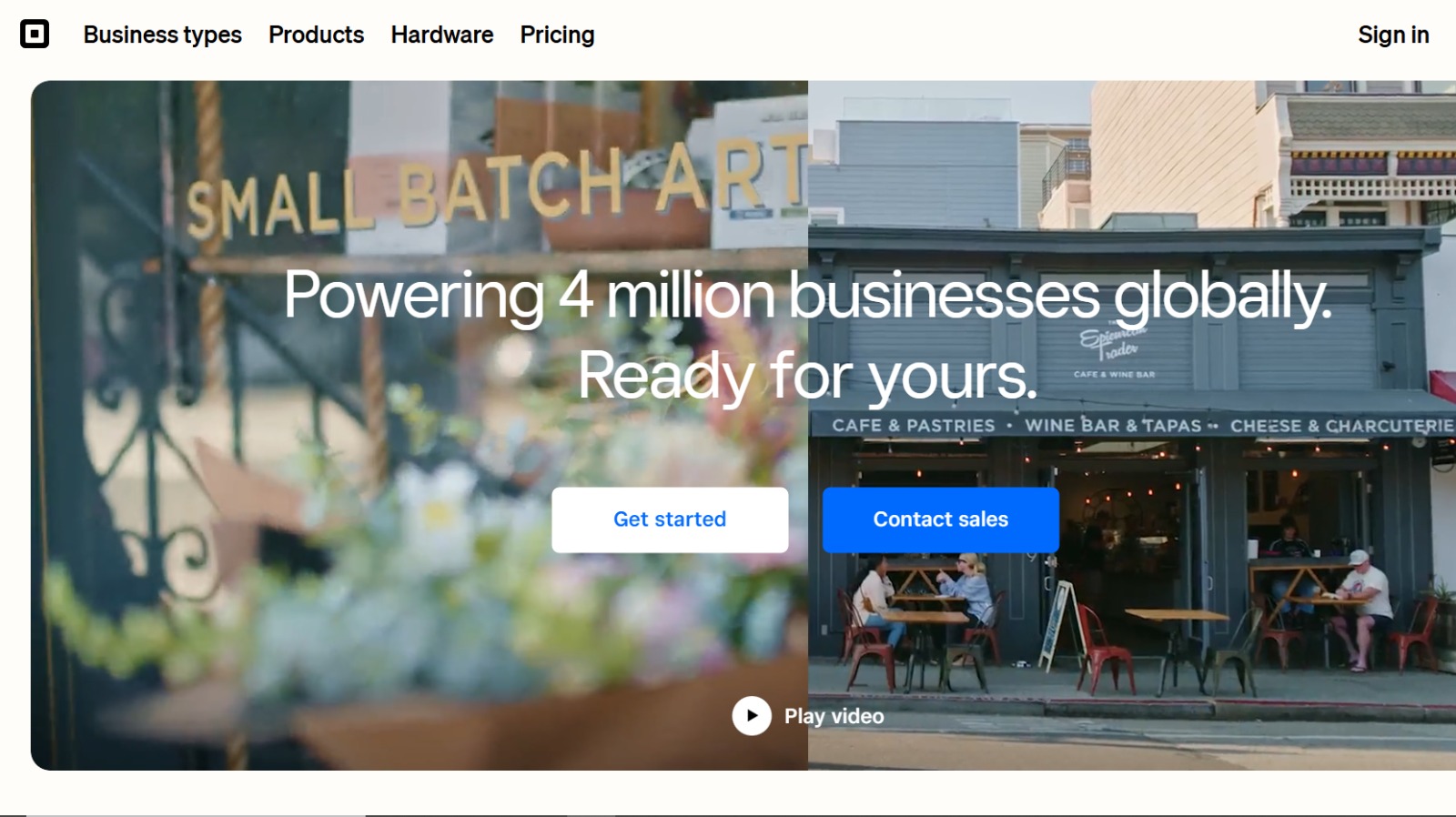
Square is one of the most accessible and user-friendly credit card processing platforms available, especially for small businesses with physical storefronts or mobile setups. Known for its sleek POS hardware and intuitive software, Square offers a complete solution for in-person, online, and mobile sales. With no monthly fees and a simple flat-rate pricing model, it’s ideal for small retailers, food vendors, service providers, and solopreneurs.
Features
- Free POS software and customizable hardware options
- Flat-rate pricing with no monthly fees
- Omnichannel capabilities (in-store, online, mobile)
- Inventory, employee, and customer management tools
- Built-in invoicing, reporting, and real-time sales tracking
- Integrates with eCommerce, booking, and accounting tools
Reviews
Users consistently praise Square for its simplicity, affordability, and all-in-one design. It’s easy to set up and operate, even for those without technical experience. Merchants appreciate the free POS tools and seamless syncing between in-person and online transactions. Some users, however, express concerns over occasional account holds and the lack of volume-based discounts.
Pros
- Free POS app with strong mobile functionality
- Flat-rate, transparent pricing
- No monthly fees for basic use
- Excellent for small and mobile businesses
Cons
- Limited customization for advanced businesses
- No volume discounts for high-volume sellers
- Occasional account stability or freezing issues
- Customer support can be slow during high-demand times
Final Verdict
Square is an outstanding solution for small businesses that want to accept credit cards without upfront costs or complex setup. It’s perfect for local retailers, market vendors, cafes, and professionals needing fast, reliable payments with POS support. While it may not offer the depth needed by large enterprises, its simplicity, flexibility, and value make it a top choice for startups and growing brick-and-mortar businesses in the USA.
3. Shopify Payments – Best for Shopify eCommerce Stores
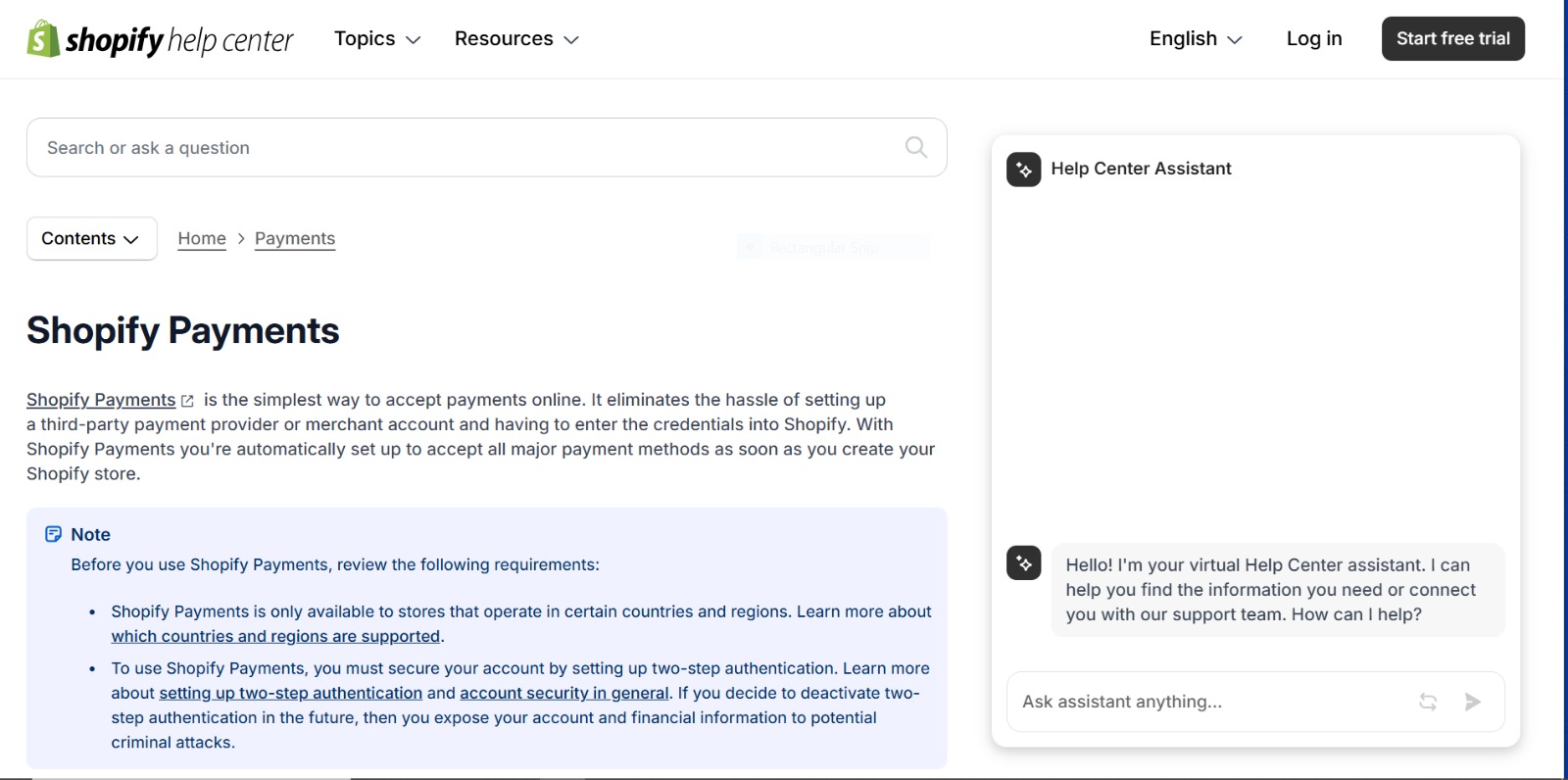
Shopify Payments is Shopify’s built-in credit card processing solution designed to work seamlessly with its eCommerce platform. It allows merchants to accept online payments directly without the need for third-party gateways. With competitive flat-rate fees and tight integration into the Shopify dashboard, it’s an ideal option for online retailers using Shopify to manage their stores. It simplifies setup, eliminates transaction fees (within Shopify), and supports global currencies.
Features
- Fully integrated into Shopify’s dashboard
- Accepts major credit cards, Apple Pay, Google Pay
- Supports multi-currency and international payments
- Automatic chargeback handling and fraud tools
- No third-party gateway required
- Unified reporting and sales management
Reviews
Shopify users love how easy it is to get started with Shopify Payments—no complex configuration, no extra fees for third-party processors, and unified management under one roof. Reviews highlight the convenience and streamlined user experience. However, it’s exclusive to Shopify users and may lack the advanced features offered by dedicated processors.
Pros
- Seamless integration with Shopify platform
- No extra transaction fees when using Shopify Payments
- Simple setup and user-friendly dashboard
- Supports multiple currencies and payment methods
Cons
- Only available to Shopify users
- Limited control over processor settings
- Chargeback fees and account holds may apply
- Not ideal for businesses needing external platform flexibility
Final Verdict
Shopify Payments is the go-to option for Shopify store owners who want a hassle-free, fully integrated payment solution. It’s convenient, cost-effective, and designed for ease of use. For merchants who are all-in on Shopify, it offers simplicity and control in one place. Businesses not using Shopify, however, will need to look elsewhere for credit card processing.
4. Braintree (by PayPal) – Best for Online and Mobile Payments
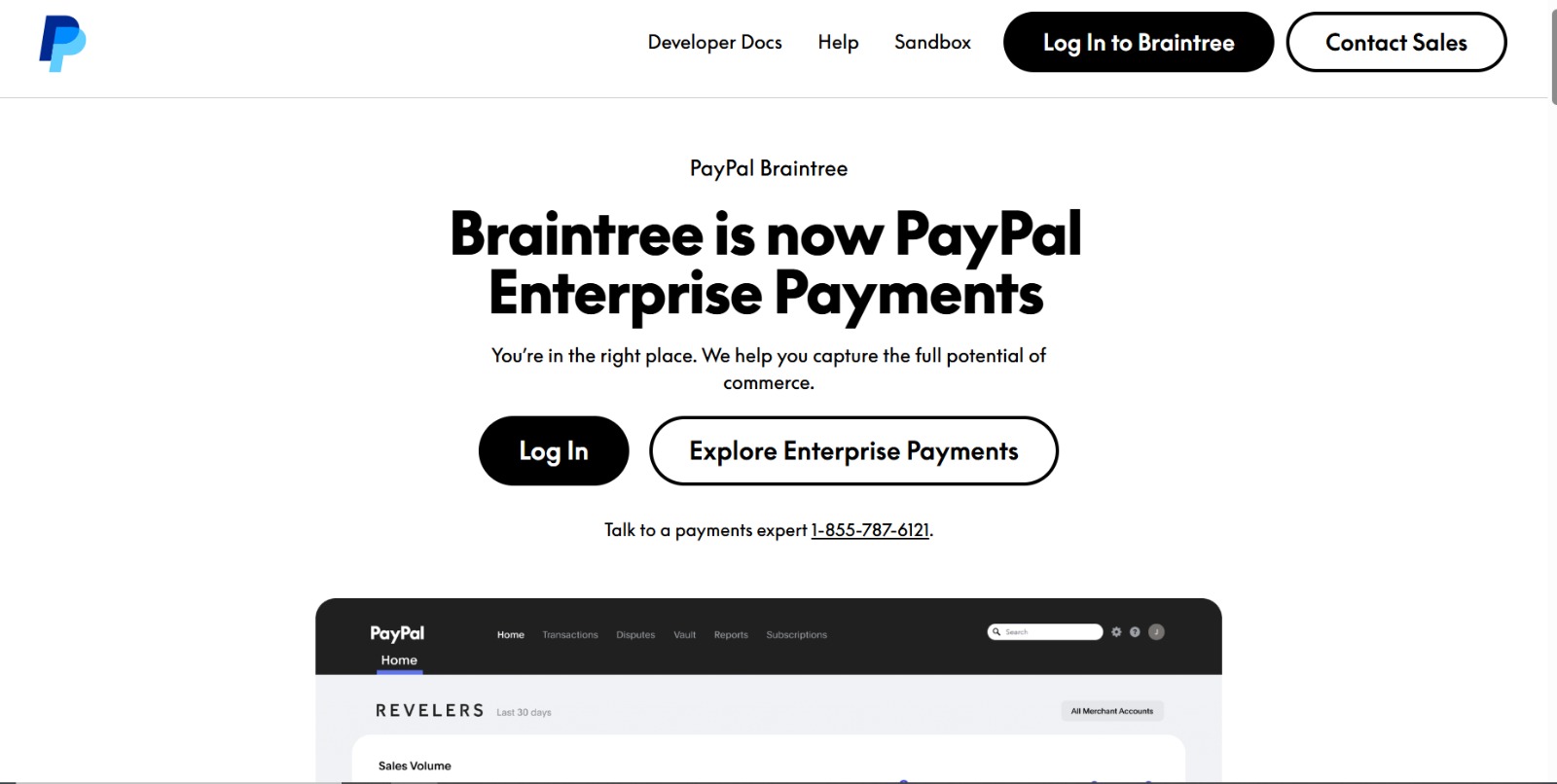
Braintree, a service by PayPal, is a powerful credit card and digital payment processing platform best suited for online businesses, mobile apps, and SaaS platforms. It supports a wide range of payment methods, including credit/debit cards, PayPal, Apple Pay, Google Pay, and even Venmo. With robust APIs, advanced fraud protection, and support for recurring billing, Braintree is ideal for tech-forward businesses needing flexibility and global reach.
Features
- Accepts multiple payment types (cards, wallets, PayPal, Venmo)
- Built-in support for recurring billing and subscriptions
- Developer-friendly API with flexible integration
- Strong fraud protection and PCI compliance tools
- International payments and currency conversion
- Hosted fields and drop-in UI options
Reviews
Braintree is well-regarded by developers and online businesses for its robust capabilities, flexibility, and seamless integration with PayPal. Businesses appreciate the variety of payment options and high level of control. Some users, however, find it a bit complex to set up and note longer onboarding or support response times.
Pros
- Wide variety of payment method support
- Strong recurring billing and mobile payment features
- Secure and developer-friendly
- Backed by PayPal’s infrastructure
Cons
- Requires technical expertise to implement fully
- Not beginner-friendly for non-developers
- Longer onboarding and account approval process
- May charge higher fees for certain international transactions
Final Verdict
Braintree is a top-tier solution for online and mobile-focused businesses that need flexibility, recurring billing, and international payment support. It’s particularly well-suited for SaaS companies, subscription services, and mobile apps. While it requires some technical implementation, its extensive capabilities and PayPal-backed trust make it a solid choice for U.S. companies aiming to scale digital operations.
Here are the full entries for 5 to 10, written in the same format and length as the previous ones:
5. Helcim – Best for Fast-Growing Businesses with Transparent Pricing

Helcim is a Canadian-based credit card processing platform that’s quickly gaining popularity in the U.S. for its transparent, interchange-plus pricing model and zero monthly fees. It’s designed for growing small to medium-sized businesses that want access to professional-grade tools without hidden costs. With built-in invoicing, online checkout, POS support, and a customer portal, Helcim offers an all-in-one solution for scaling operations efficiently.
Features
- Transparent interchange-plus pricing with no monthly fees
- All-in-one platform: invoicing, POS, inventory, and reporting
- Online checkout, hosted payment pages, and subscriptions
- Free virtual terminal and customer portal
- Supports ACH, credit/debit cards, and recurring payments
Reviews
Business owners appreciate Helcim’s honesty in pricing and the robust features packed into its free offering. It earns strong reviews for customer service, ease of use, and comprehensive functionality. However, some users feel the customization and integration options are not as advanced as larger competitors.
Pros
- Interchange-plus pricing with no hidden fees
- No monthly subscription required
- Strong reporting and invoicing tools
- Excellent customer support
Cons
- Limited advanced integrations
- No built-in support for high-risk industries
- Not ideal for very large enterprises
- Physical card reader options are limited
Final Verdict
Helcim is a strong option for fast-growing businesses that value transparency, flexibility, and a full suite of tools without paying monthly fees. While it may lack some of the complex features offered by enterprise-grade processors, it’s a customer-friendly and scalable solution for most U.S.-based small businesses on the rise.
6. Stax – Best for High-Volume Businesses (Subscription-Based Model)
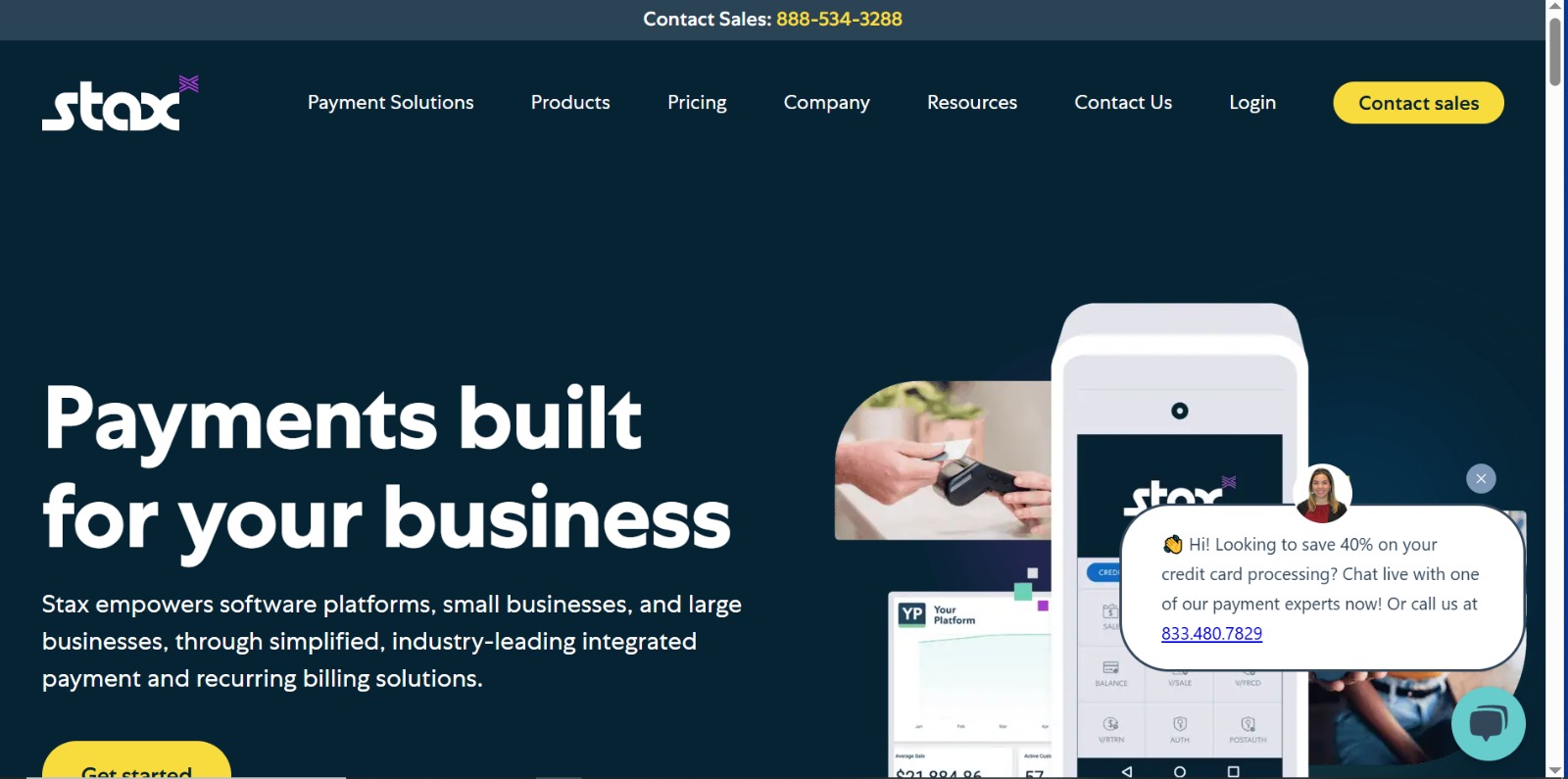
Stax offers a unique subscription-based pricing model that’s especially attractive to high-volume businesses seeking to lower transaction costs. Instead of taking a percentage of each sale, Stax charges a monthly fee for access to wholesale interchange rates. The platform also includes analytics, invoicing, virtual terminal, and POS capabilities—making it an all-in-one merchant services solution for large and fast-moving operations.
Features
- Subscription-based pricing for wholesale interchange access
- Free mobile and desktop POS solutions
- Invoicing, recurring billing, and inventory tracking
- Real-time analytics and reporting dashboard
- Integrates with accounting, CRM, and eCommerce tools
Reviews
Users love how much they save in transaction fees once their sales volume grows. Stax is especially popular among large retailers and service providers. However, some reviews note that the subscription fee may not be cost-effective for low-volume merchants and that support can be hit or miss.
Pros
- Wholesale pricing with no markup per transaction
- Powerful analytics and reporting tools
- Includes both online and POS solutions
- Scalable features for growing operations
Cons
- High monthly fees for smaller businesses
- Not cost-effective at lower transaction volumes
- No international payment support
- Customer service can be inconsistent
Final Verdict
Stax is an excellent choice for high-volume U.S. businesses that want to maximize savings on processing costs. Its subscription model rewards scaling and offers full-featured tools for both online and in-person sales. For businesses processing tens of thousands per month, Stax delivers significant ROI—though it’s not ideal for startups or low-volume operations.
7. PaymentCloud – Best for High-Risk Businesses (e.g., CBD, Firearms, etc.)

PaymentCloud specializes in merchant services for high-risk industries such as CBD, adult products, firearms, nutraceuticals, and online gambling. While many processors reject such businesses, PaymentCloud connects them with banks that support their specific vertical. It offers virtual terminals, eCommerce integrations, fraud tools, and chargeback protection, with a personalized account setup process.
Features
- Specialized support for high-risk industries
- Integration with WooCommerce, Shopify, Magento, and others
- Virtual terminals, fraud detection, and chargeback tools
- Domestic and offshore merchant accounts available
- Personalized onboarding and risk assessment
Reviews
High-risk business owners consistently recommend PaymentCloud for its willingness to work with challenging industries. Its concierge-style setup and account matching process get high marks. However, some users note that pricing varies by business type and isn’t always fully transparent up front.
Pros
- Accepts high-risk business types most processors reject
- Hands-on onboarding and support
- Integrates with major eCommerce platforms
- Strong fraud and risk mitigation tools
Cons
- Pricing varies and may lack transparency
- Requires underwriting and approval time
- Not suited for low-risk, mainstream businesses
- No instant account setup available
Final Verdict
PaymentCloud is a lifeline for high-risk businesses that can’t find support elsewhere. Its expert team works closely with clients to navigate underwriting, compliance, and fraud prevention. While pricing depends on risk level and may be higher than standard processors, it’s one of the few reliable solutions for legally compliant businesses in restricted industries.
8. Payment Depot – Best for Transparent, Membership-Style Pricing
Payment Depot offers a membership-style pricing model, providing businesses with access to wholesale interchange rates for a flat monthly fee. It’s a cost-effective option for U.S. businesses processing moderate to high volumes. Payment Depot includes credit card terminals, virtual terminals, POS integrations, and excellent customer support. It’s particularly attractive to merchants tired of unpredictable per-transaction fees.
Features
- Wholesale interchange rates with a fixed monthly membership
- Free terminal options and virtual terminal access
- Online payments, mobile, and in-store POS integration
- PCI compliance and fraud prevention tools
- 24/7 U.S.-based customer support
Reviews
Payment Depot is frequently praised for its transparency and excellent customer service. Businesses appreciate knowing exactly what they’ll pay, especially as their volume increases. However, it’s less cost-effective for small businesses and lacks support for international payments or high-risk industries.
Pros
- Simple, transparent pricing model
- High-quality customer support
- Compatible with multiple POS systems
- Free credit card terminal provided
Cons
- Monthly fee not ideal for small-volume businesses
- Limited to U.S. merchants only
- No support for high-risk business types
- International payments not supported
Final Verdict
Payment Depot is a fantastic option for medium to large U.S. businesses that value clear pricing and predictability. Its membership-based approach removes the guesswork from processing costs and helps growing companies manage expenses. While not suitable for startups or international sellers, it’s one of the most honest and straightforward processors available.
9. GoCardless – Best for Recurring and Direct Debit Payments

GoCardless specializes in direct debit payments and recurring billing, making it ideal for subscription-based businesses, service providers, and invoice-based companies. It offers seamless integrations with major accounting platforms like Xero and QuickBooks and supports global recurring payments across multiple currencies. GoCardless is perfect for automating cash flow and reducing late payments.
Features
- Direct debit and ACH payments for recurring billing
- Easy integration with Xero, QuickBooks, and SaaS tools
- Multi-currency support and global payment coverage
- Automated payment collection and retry logic
- Real-time dashboard and reporting
Reviews
Users appreciate GoCardless for simplifying recurring payments and reducing payment delays. It’s particularly popular among SaaS companies, gyms, and professional services. Some users, however, mention that it doesn’t support card payments and lacks POS capabilities.
Pros
- Excellent for recurring and subscription payments
- Easy-to-integrate with finance software
- International direct debit support
- Automates collections and reduces admin
Cons
- No support for credit/debit card payments
- Not suited for retail or POS-based businesses
- Limited customization for checkout experiences
- Initial setup requires verification and approval
Final Verdict
GoCardless is a niche but powerful option for U.S. businesses built on recurring revenue. Whether you’re billing clients monthly or collecting subscriptions, it automates payment processes and improves cash flow. While it doesn’t support card payments or retail use, it’s the go-to solution for businesses prioritizing automated invoicing and direct debit transactions.
10. Clio Payments – Best for Law Firms (Integrated with Clio Legal Software)
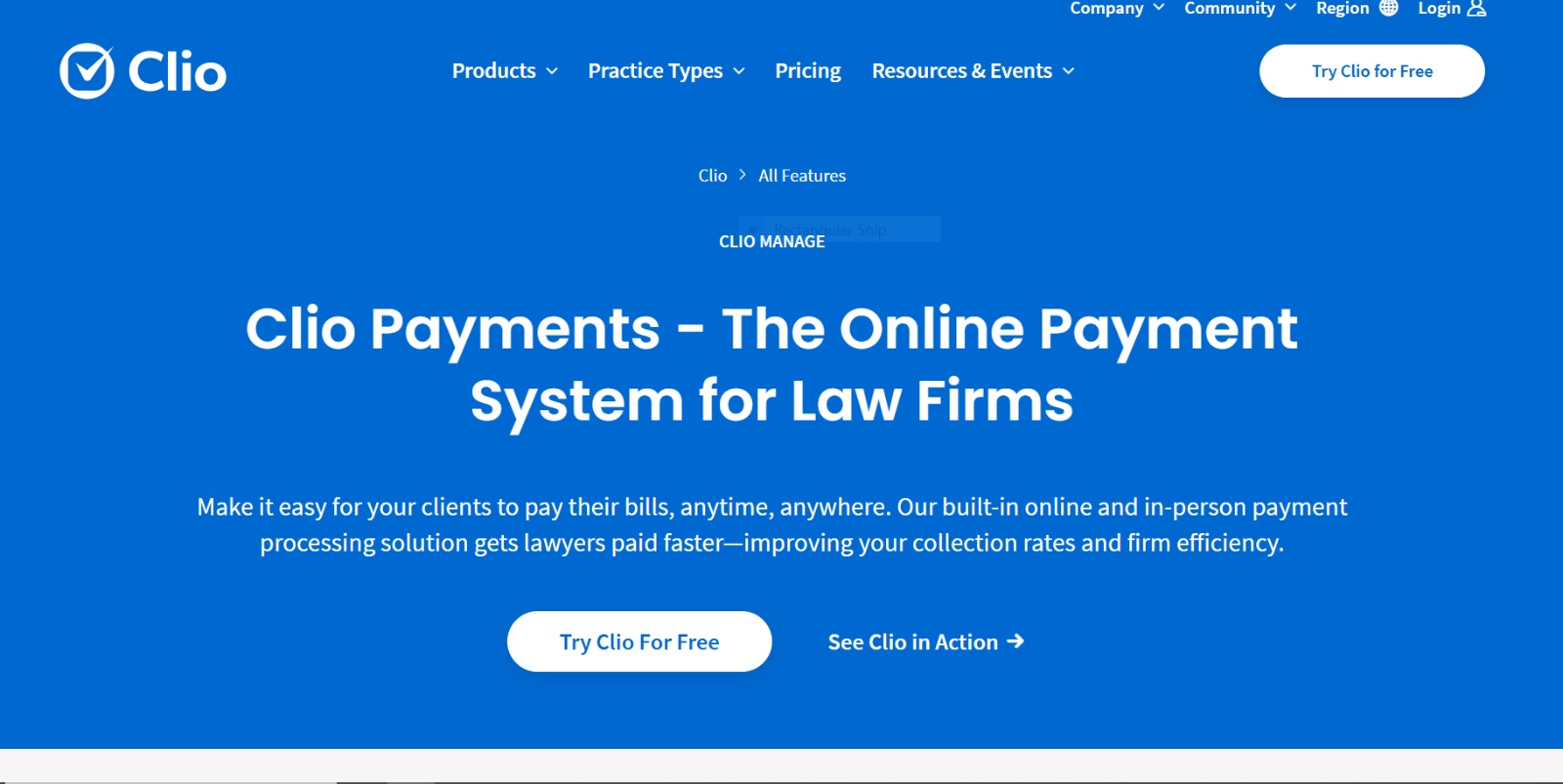
Clio Payments is a credit card and eCheck payment processing tool embedded within Clio, a leading legal practice management platform. Tailored specifically for law firms, it ensures full compliance with legal payment regulations, including trust accounting (IOLTA). It allows firms to accept payments directly from invoices, schedule payment plans, and manage billing from one secure platform.
Features
- Seamless integration with Clio Manage and Clio Grow
- Accepts credit cards and eChecks securely
- Trust accounting (IOLTA) compliance
- Scheduled payments and client-facing payment links
- Real-time payment tracking and reporting
Reviews
Law firms appreciate the tight integration with Clio’s practice management software and the ability to maintain ethical compliance. Reviews mention improved client experience and faster collections. On the downside, it’s only available to Clio users and isn’t suitable for non-legal businesses.
Pros
- Designed for legal billing and compliance
- Secure and client-friendly payment options
- Simplifies reconciliation and reporting
- Supports automated payment plans
Cons
- Only available to Clio subscribers
- Not suitable for other industries
- No physical POS or mobile app for payments
- Some users find onboarding slightly complex
Final Verdict
Clio Payments is an essential tool for law firms using Clio’s legal management suite. It offers a compliant, secure, and seamless way to collect payments while maintaining trust account regulations. Although it’s exclusive to Clio users, it provides unmatched value for legal practices seeking an all-in-one billing and payment solution.
11. Versapay – Best for Accounts Receivable Automation and B2B Collaboration
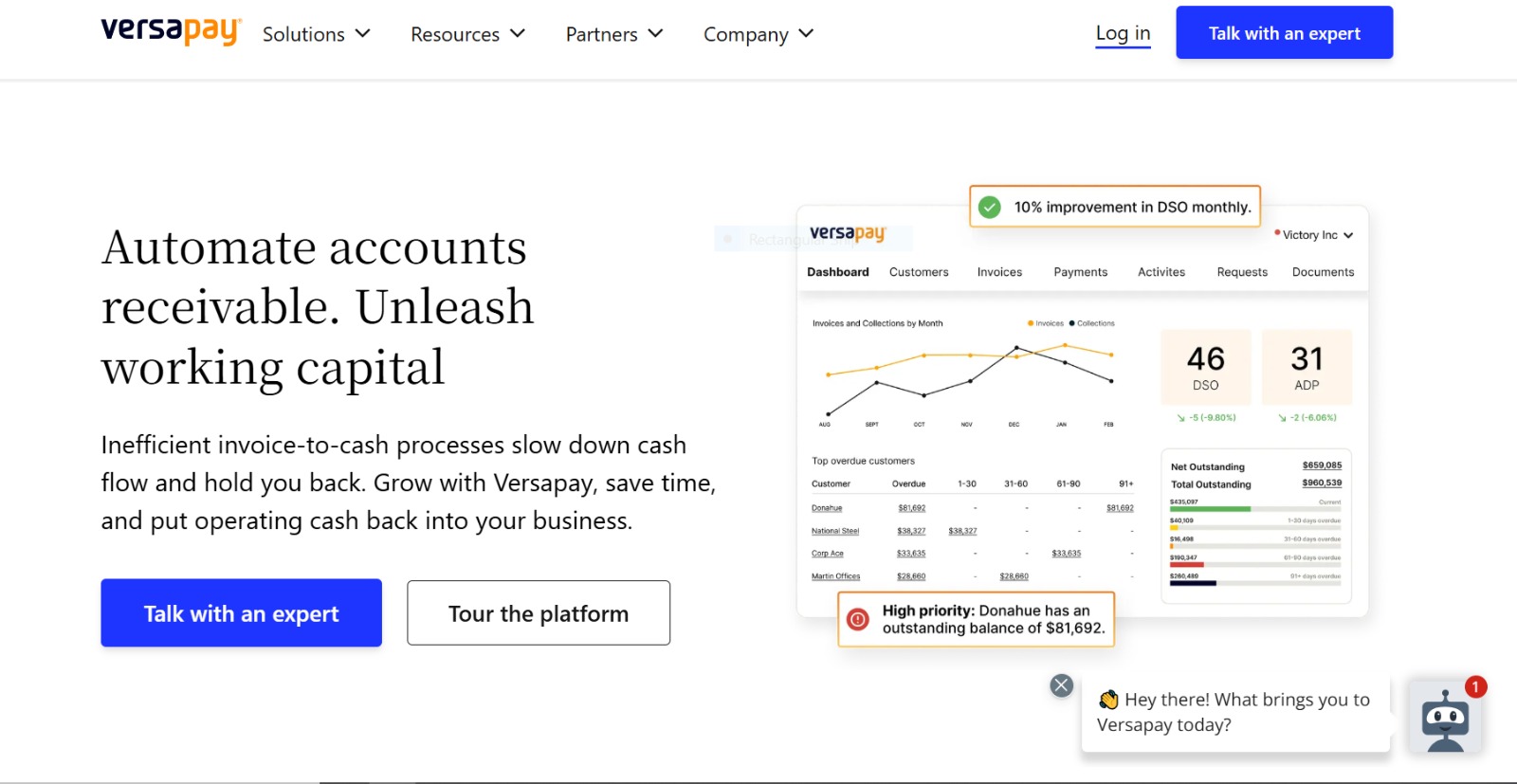
Versapay is a cloud-based accounts receivable platform designed to streamline invoice-to-cash workflows and enhance collaboration between B2B buyers and sellers. It integrates with popular ERPs like NetSuite, Microsoft Dynamics, and Sage, making it ideal for mid-sized to large enterprises looking to automate collections, improve cash flow, and eliminate manual processes.
Features
- Automated invoicing, payment reminders, and reconciliation
- Real-time customer collaboration portal
- ERP integrations (NetSuite, Microsoft Dynamics, Sage, etc.)
- ACH, credit card, and digital wallet payment support
- Advanced reporting and analytics for finance teams
Reviews
Versapay is praised for transforming the traditional AR process by increasing visibility and reducing collection cycles. Finance teams value its automation and communication tools. However, users mention the platform is geared toward larger organizations and has a learning curve during setup.
Pros
- Excellent for automating AR workflows
- Improves collaboration with customers
- Strong ERP integrations
- Reduces DSO (Days Sales Outstanding)
Cons
- Best suited for mid-sized to large enterprises
- May require training for full utilization
- Implementation can be time-consuming
- Pricing not transparent on the website
Final Verdict
Versapay is a powerful solution for businesses seeking to modernize accounts receivable processes. With strong ERP integrations and collaborative tools, it reduces manual workload and accelerates payment collection, though it’s most effective for larger, B2B-focused organizations.
12. Clearly Payments – Best for Lowest Processing Fees with Great Support

Clearly Payments offers competitive credit card processing with transparent pricing, no hidden fees, and strong customer service. It serves a wide range of industries and is well-known for offering some of the lowest processing fees in the market while maintaining reliability and ease of integration.
Features
- Transparent interchange-plus pricing model
- Easy setup with POS, mobile, and online payments
- Supports recurring billing and invoicing
- Integrates with QuickBooks, WooCommerce, and more
- Dedicated customer support
Reviews
Users commend Clearly Payments for its honest pricing, responsive support, and easy-to-use tools. Small businesses especially appreciate its budget-friendly structure. Some users note limited availability of advanced features.
Pros
- Low and transparent processing fees
- Excellent customer service
- Simple and clear onboarding
- Flexible integrations
Cons
- Limited advanced reporting tools
- Fewer value-added services than larger providers
- Not ideal for complex enterprise needs
- Limited international support
Final Verdict
Clearly Payments is a great choice for small to mid-sized businesses prioritizing cost efficiency and customer service. Its low fees and simple setup make it ideal for those seeking a no-nonsense credit card processor.
13. NetSuite Payment Processing – Best for ERP-Integrated Payment Management
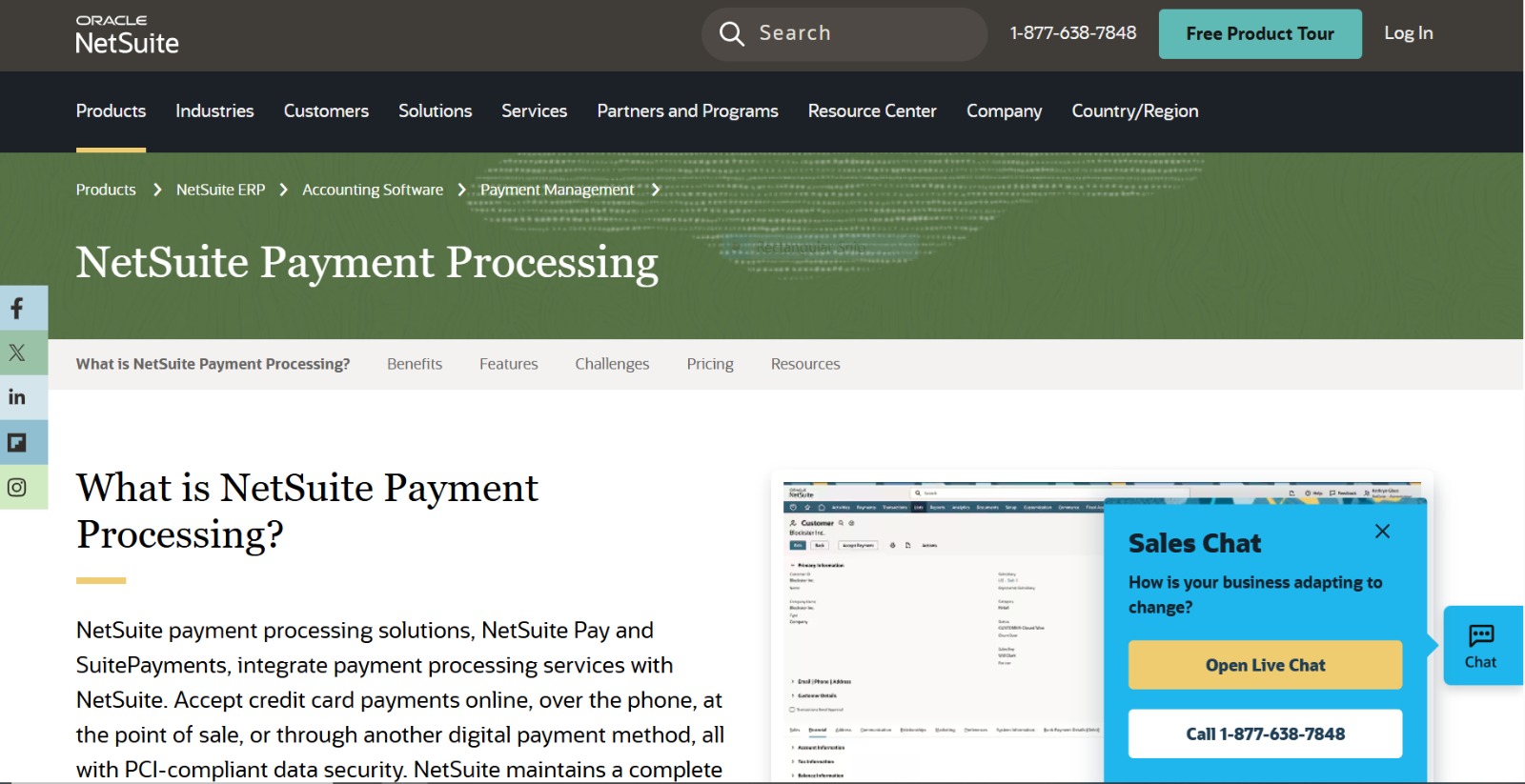
NetSuite Payment Processing is built into Oracle’s NetSuite ERP system, making it ideal for businesses looking for end-to-end financial management and integrated payments. It supports B2B and B2C transactions and automates payment reconciliation within the same ecosystem.
Features
- Fully integrated with NetSuite ERP
- Accepts credit cards, ACH, and other digital payments
- Automated billing, invoicing, and reconciliation
- PCI-compliant and secure
- Real-time financial reporting
Reviews
NetSuite Payment Processing is appreciated for streamlining payments within the ERP system, saving time and reducing errors. However, users note that it’s best suited for those already using NetSuite and may be overkill for smaller businesses.
Pros
- Deep ERP integration
- Automates finance operations
- Secure and PCI-compliant
- Scalable for large enterprises
Cons
- Only available for NetSuite users
- High cost compared to standalone processors
- Long implementation timeline
- Complex setup and learning curve
Final Verdict
If your business already runs on NetSuite, its payment processing feature is a natural fit. It enhances financial accuracy, automates processes, and consolidates operations—but is best for medium to large organizations.
14. CardX (by Stax) – Best for Businesses Interested in Compliant Surcharging
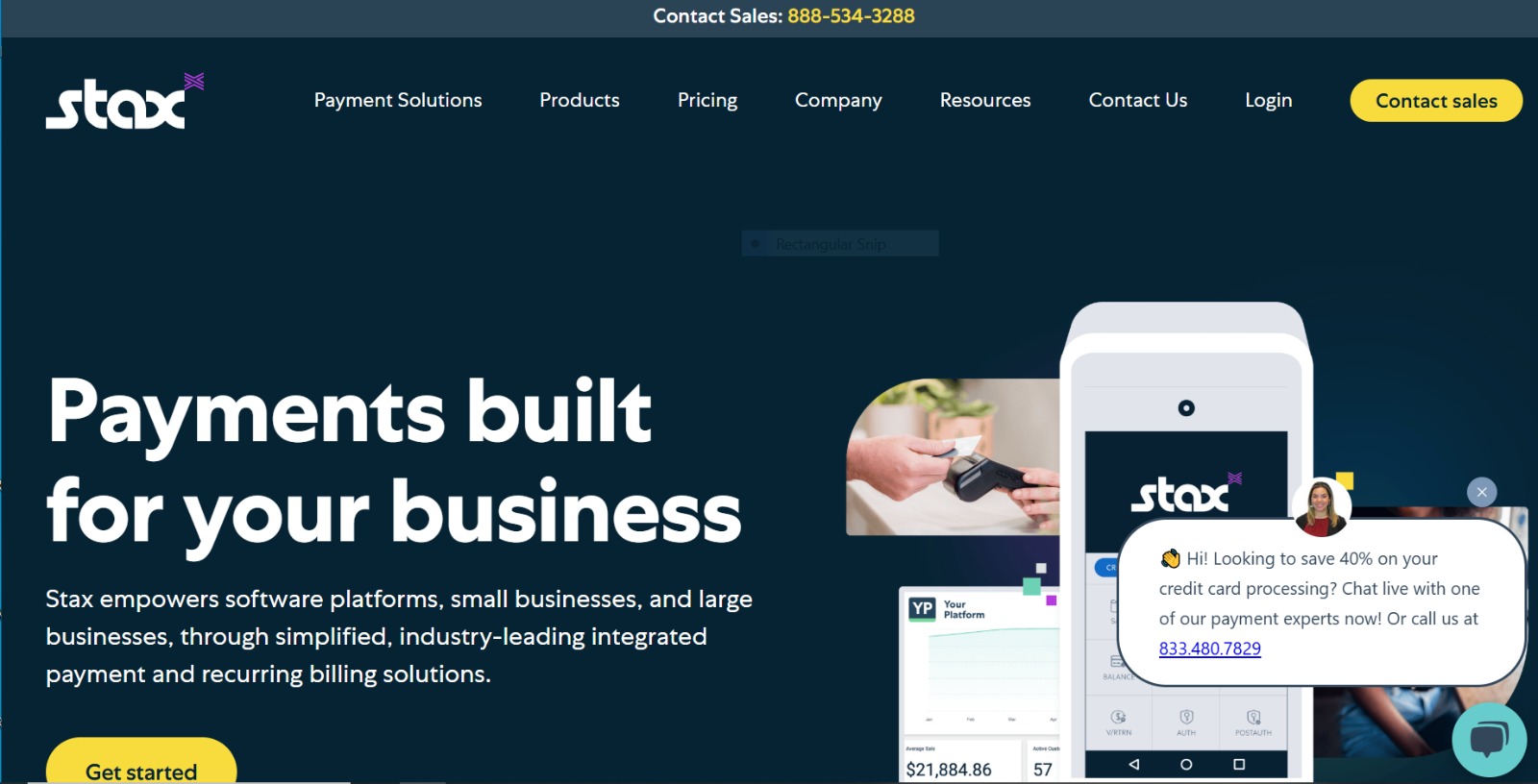
CardX specializes in compliant surcharging solutions, allowing businesses to pass credit card processing fees to customers legally and transparently. It’s particularly valuable for businesses that want to reduce or eliminate their own transaction costs without violating payment regulations.
Features
- Compliant credit card surcharging in all legal U.S. states
- Built-in compliance with card network rules
- Online and in-person payment solutions
- Seamless integration with POS and eCommerce platforms
- Real-time fee disclosure to customers
Reviews
Businesses using CardX praise it for reducing their processing costs and maintaining compliance with surcharging laws. Users also find the platform easy to integrate. However, some report that customers may be discouraged by added surcharges.
Pros
- Legal and transparent surcharging
- Helps reduce business expenses
- Easy integration and automation
- Supports both online and offline payments
Cons
- Not allowed in all U.S. states
- Some customer resistance to surcharges
- Limited customization options
- Only works with credit, not debit cards
Final Verdict
CardX is ideal for U.S. businesses aiming to offset credit card fees legally. It’s a compliant, straightforward solution that minimizes transaction costs—but may impact customer experience in sensitive markets.
15. Sage Debit and Credit Card Processing – Best for ERP Integration and Accounting Systems
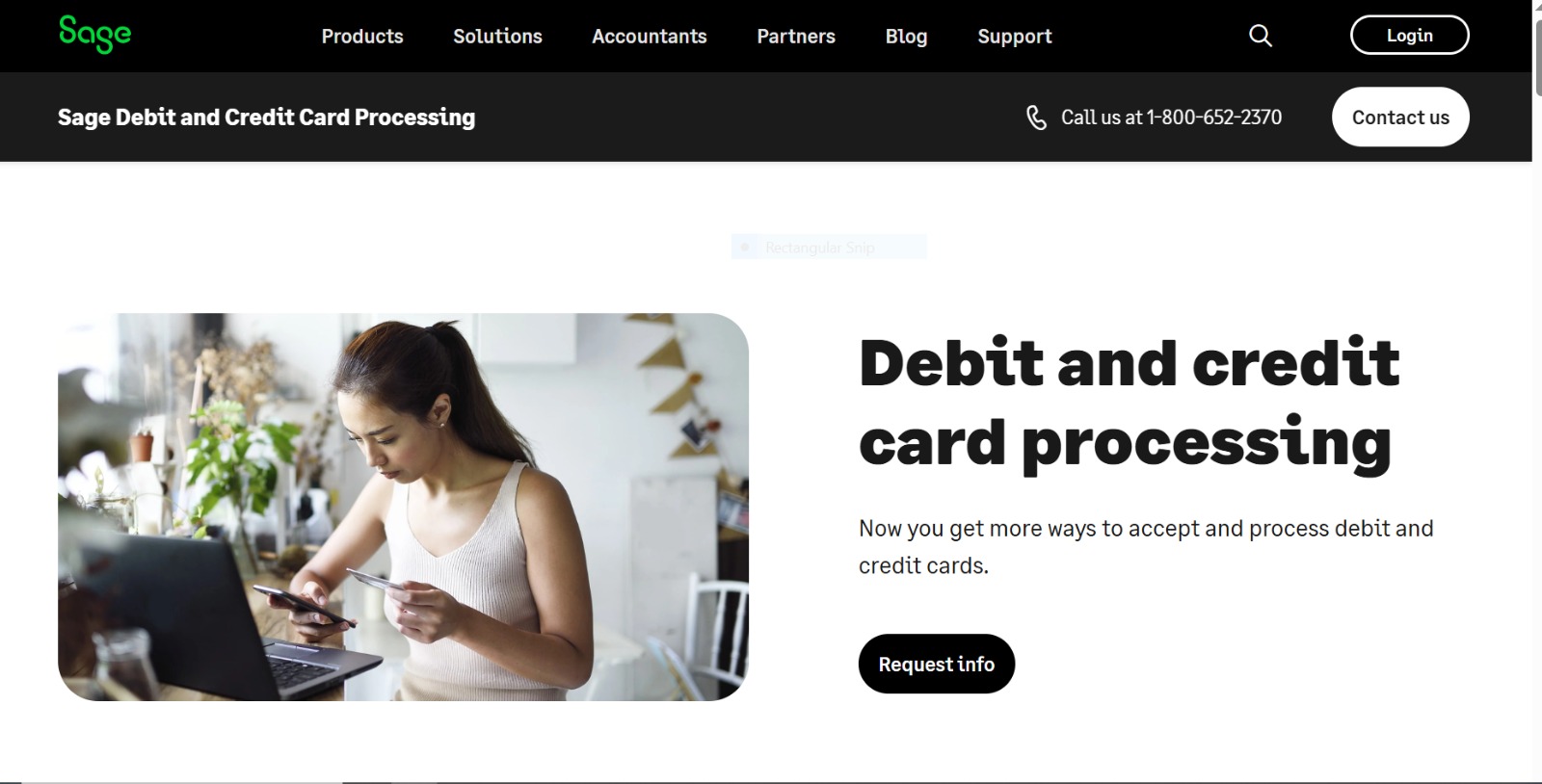
Sage offers integrated debit and credit card processing for businesses already using Sage accounting or ERP software. This integration simplifies accounting, automates reconciliation, and ensures compliance for businesses with recurring billing or complex payment needs.
Features
- Seamless integration with Sage Accounting and ERP
- Supports credit card, debit card, and ACH payments
- Automated reconciliation and transaction logging
- PCI-compliant and secure
- Ideal for service businesses and professionals
Reviews
Sage users highlight the convenience of having accounting and payments in one platform. The system helps reduce reconciliation errors and manual entry. However, it may lack flexibility for businesses not already using Sage products.
Pros
- Ideal for Sage users
- Improves accounting accuracy
- Reduces manual work
- Secure and compliant
Cons
- Limited use outside Sage ecosystem
- May not support all payment gateways
- Setup requires Sage subscription
- Not ideal for startups
Final Verdict
Sage Debit and Credit Card Processing is a logical extension for businesses already using Sage software. It simplifies financial workflows and boosts efficiency but may not suit businesses seeking stand-alone payment solutions.
Frequently Asked Questions (FAQs)
What is credit card processing software?
It’s a tool that helps businesses accept and manage credit card payments securely through online, in-store, or mobile channels.
Which is the best credit card processor for small businesses?
Square and Helcim are top choices due to their ease of use, low fees, and flexibility for growing small businesses.
Can I accept international payments with these platforms?
Yes, many processors like Stripe, Braintree, and Shopify Payments support global transactions and multiple currencies.
Are there hidden fees in credit card processing?
Some providers have hidden fees, but transparent platforms like Clearly Payments and Stax use flat-rate or membership-based pricing.
Is it safe to process payments with these tools?
Yes, all reputable credit card processors listed here are PCI-compliant and use encryption to protect customer data.
